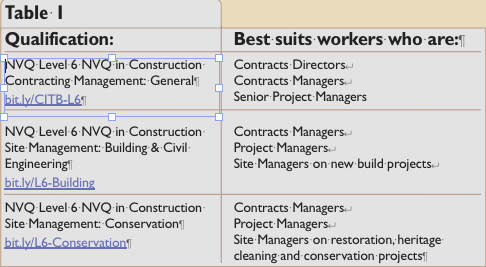Mark Priestman has more than 20 years’ experience in the natural stone sector. He plays an active role in the development and delivery of training in this specialist environment. Along with his father, David Priestman, he runs a training consultancy whose mantra is: Qualify the Workforce!
Essential Guide to NVQ qualifications for the Stone Sector – Part 1: Contract Managers and Site Managers
Today, not for the first time, I was asked the question: ‘What NVQs should I put my lads through?’
This is a fair enough question, since the National Vocational Qualification is the gateway to achieving a CSCS card and accessing construction sites throughout the UK.
I’d like to answer that question here, but I’d like to turn it on its head and suggest that the best method for any training or skills certification programme is a top-down approach.
In a five-part series of which this is the first, I will address qualifications needed to achieve the first principle CSCS cards:
Part 1 – Contract Managers and Site Managers
Part 2 – Supervisors, Contracts Operatives and Heritage trades
Part 3 – Skilled Workers
Part 4 - Trainees
Part 5 – Labourers, masons’ mates and improvers.
So, to begin, the CSCS Manager’s Card (the Black Card).
The manager’s card is available to construction contracting managers and construction site managers in our sector.
Under the CSCS initiative to have ALL site personnel issued with the right card for the work they are actually doing, anyone managing a construction project needs this card. So how is it achieved?
 Vocational Qualifications (also known as NVQs) are the key to unlocking the CSCS system. For a manager’s card, applicants will most likely want to pursue one of the three relevant NVQs listed in Table 1.
Vocational Qualifications (also known as NVQs) are the key to unlocking the CSCS system. For a manager’s card, applicants will most likely want to pursue one of the three relevant NVQs listed in Table 1.
Generally, these qualifications are assessed via a route called on-site assessment & training (OSAT). This means disturbance to the businesses they work for is minimal.
An assessor will visit the learner to induct them on to the programme and to discuss evidence gathering with them. Subsequent visits will collect that evidence and also facilitate the assessor observing the learner at work and recording professional discussions.
I’m often asked how long all this will take.
Honestly, it depends on the learner. But I’d hazard a suggestion that the whole process normally takes somewhere between six and nine months.
But as soon as the learner registers for the NVQ they can apply for a temporary CSCS trainee card, as long as their CSCS MAP (Managers & Professionals) touch screen pass is current.
This means that if a project is demanding CSCS card participation, then registering employees for the appropriate NVQ might be the first step to getting access to site.
As some added bonus, achievers of these three NVQs can gain entry to incorporated membership of the Chartered Institute of Building. And, currently, CITB registered firms can claim back £400 per achiever.
Management taking the lead in obtaining qualifications demonstrates the importance of training and the business grows.
Mark Priestman is a Partner at Priestman Associates LLP, a leading façade preservation project consultancy. From stonemasonry and heritage skills through to Site Supervision and Conservation Management, the partnership is trusted by the leading brands of the sector as an NVQ provider for experienced, upskiller and apprentice workers. Mobile: 07876 687212

